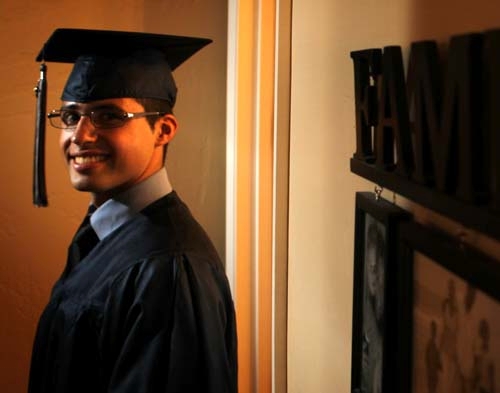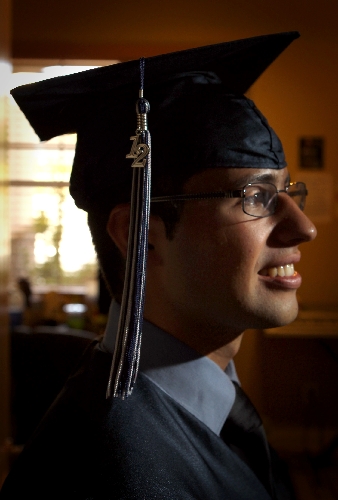Student who failed in Germany succeeds in Las Vegas



At age 15, he’d blown it in Germany and knew it.
He liked his work but couldn’t imagine a lifetime of painting cars. Returning to school was out of the question.
Germany’s public schools prohibited Fernando Gomez-Garcia, and those like him, from advancing to 10th grade or college.
"My mom told me, ‘Do good in school. Do good in school.’ But I didn’t listen," recalled 19-year-old Gomez-Garcia last week.
He didn’t think there would be any consequences for slacking off.
Later, he saw the consequences spraying out of his paint gun, marring his clothes and shoes.
Germany’s schools aren’t forgiving of youthful follies.
At 10, German students are placed on one of three tracks based on their academic performance. Gomez-Garcia’s poor performance placed him on the lowest rung of the education system, where students advance to ninth grade and then enter vocational apprenticeships. Second-level students continue through 10th or 11th grade, depending on the German state they live in.
Only third-level students make it to the 12th grade.
German colleges charge minimal tuition compared to schools in other nations, but third-level students must pass a qualifying exam called the "Abitur." Students can change tracks, but it’s difficult and didn’t happen for Gomez-Garcia, who is of Spanish descent.
Gomez-Garcia began looking for a second chance and found it in Las Vegas with his father, an officer in the U.S. Army he hadn’t seen in years and who was remarried with two children.
"I heard American schools are good if you try," said Gomez-Garcia. "There, anything’s possible. You have choices."
The little he knew about U.S. schools came from American movies. Growing up, he dreamed of high school graduations, learning about the ceremony from films such as "She’s All That" and "Drumline."
But his dad made one thing clear to Gomez-Garcia in 2009, after the teen said he wanted to attend his junior and senior years of high school in the United States.
"You’re going to straighten up and fly right," said his father, Fernando Garcia.
"I was freaked out," said Gomez-Garcia, who spoke little English at the time.
Not only would he have to do the homework and studying he had always skipped, it would be in a foreign language.
His stepmother was "terrified." She had taught in the Clark County School District for a decade and worked with many English Language Learner students.
"I had a lot of ELL kids, which was challenging," said Renee Paterson, who doesn’t speak Spanish or German. "Now, I had to live with one."
This would be different, reassured her husband at the time.
"Fernando already hit the wall, was going to lose out on everything," his father recalled.
And the teen knew it.
"It was a really hard decision for me, really hard," said Gomez-Garcia, who was living in the southwest German city of Karlsruhe with his mother, sisters, grandparents and aunts. "But I saw no other option for me."
The paperwork for his American visa took more than a year.
■ ■ ■
May 31, 2010.
Gomez-Garcia remembers the date as if it were his birthday. It’s when he boarded a 12-hour flight for Las Vegas, using a plane ticket that his dad bought for him.
After overcoming the shock of desert heat, he spent the summer learning English. He used computer programs, books and even his new siblings to improve his language skills.
"I wrote down every important word I heard," Gomez-Garcia said.
His stepmother enrolled him at East Career & Technical Academy, a public high school offering specialized areas of study, such as culinary arts, early childhood education and electronic engineering technology. He chose the hospitality management program.
Magnet high schools draw driven students, an atmosphere Gomez-Garcia needed to keep him on track, said Paterson, who feared her stepson would lapse into old habits at a traditional high school.
"I didn’t want him exposed to unmotivated learners," said Paterson, who "begged" for her stepson to get into East Tech. "If they could have read his German transcript, he wouldn’t have gotten in."
Gomez-Garcia soon learned American school is nothing like school in Germany. He was used to being with the same students all day in one classroom. The faces changed every 50 minutes at his new school, and he moved all over campus.
He wasn’t shy about his lack of knowledge. "I told every teacher, ‘Sorry if I raise my hand too much.’ "
And he soon realized Americans love foreigners.
"Women love my accent," he said, laughing.
He had to work twice as hard as other students because of his fledgling English skills. His test scores were often C’s and D’s. But he made up for it with spotless homework and class presentations.
"It feels so good when you don’t miss homework," he said.
His first semester in 2010, he earned four A’s, three B’s and one C. Semester after semester, he’d always have one C in a history course. "So much reading and English," he said.
Summer didn’t offer a reprieve. He was at school from 8 a.m. to 4 p.m. taking four courses, with just a three-week break before fall.
At times, he second-guessed his decision to pursue a U.S. high school diploma. But that didn’t last long.
"My dad never stopped telling me to keep working and it would pay off. It was a pain, but really helped me," said Gomez-Garcia, laughing at how well his dad came to know all his junior-year teachers. "Oh, man."
He ended his spring semester as a senior with six A’s, two B’s and, finally, no C’s.
"I always fought for that," he said.
He also passed all sections of the Nevada High School Proficiency Exam, which covers reading, writing, math and science. It took four tries for science and help from science teacher Sarah MacNab.
"I never heard a ‘No’ from my teachers," he said. "School here is not that hard, but you still have to put everything in that you can. Germany is harder. Here, students have the choice for school to be hard."
Gomez-Garcia now plans to spend two years at the College of Southern Nevada before delving into hospitality management at the University of Nevada, Las Vegas.
But first, a little reveling.
Decked out in a dark blue graduation gown, he couldn’t help but smirk Wednesday morning as he positioned his matching mortarboard above his brow. Photos of family faces, taped over his bed, smiled back.
He hasn’t seen his German family since May 31, 2010, but they planned to watch his graduation ceremony at The Orleans as it was streamed on the Web.
Moments from American teen movies flash through Gomez-Garcia’s head. An inspiring valedictorian speech. A barrage of graduation caps flying through the air. Pulling the tassel from left to right as he walks off stage.
"That’s finally going to be me," Gomez-Garcia said. "Oh, man. It’s awesome."
Contact reporter Trevon Milliard at tmilliard@reviewjournal.com or 702-383-0279.












